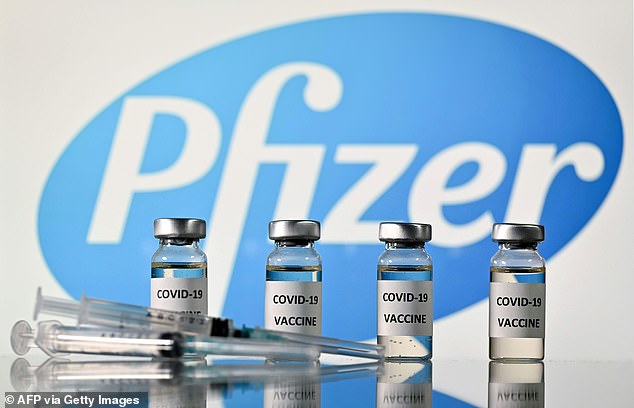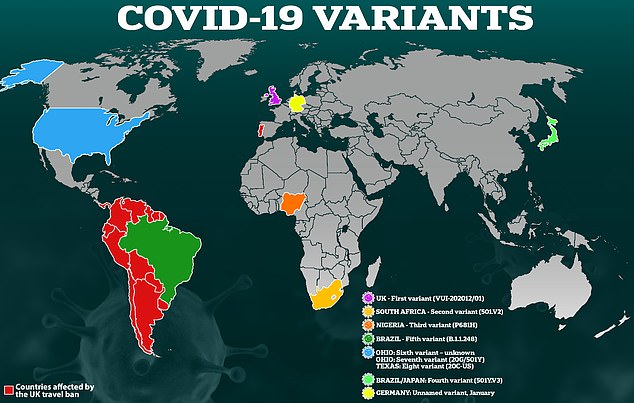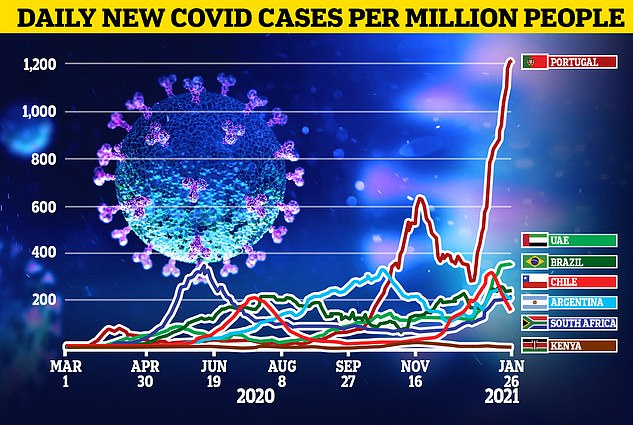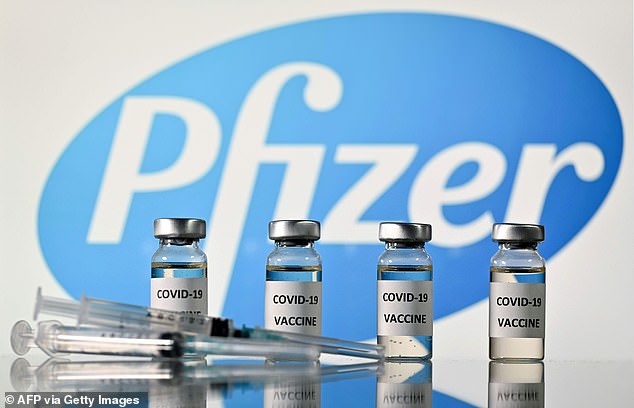Pfizer says its Covid vaccine DOES work against South African variant
Pfizer/BioNTech’s coronavirus vaccine is only slightly less effective against the super-infectious South African variant, according to a lab study by the jab makers.
Even with the slight reduction in efficacy, the research strongly suggests the vaccine will still be able to kill off the new strain before it can cause serious illness.
Researchers took blood samples from vaccinated patients and exposed them to an engineered virus with the worrying mutations found on the South African variant.
They found there was about a noticeable reduction in the production of antibodies, which are virus-fighting proteins made in the blood after vaccination or natural infection.
In a boost to the world’s immunsation efforts, the team said the number of antibodies produced was still high enough to kill the mutant strain.
This is possible because the immune system generally makes so many antibodies that it creates enough to hit the threshold needed to neutralise – or kill – the virus, and then many more on top, which are expendable.
For comparison, a similar study by Moderna found its own jab was still effective enough to kill the South African strain despite a six-fold reduction in antibodies.
While the Pfizer results are promising, they are limited because the study did not look at the full set of mutations found in the new South African variant.
The company said earlier this week that it had started work on a booster jab to make sure it could cope with new variants in case a mutation seriously affected its vaccine.
AstraZeneca, which makes one of the other major vaccines, has not published studies testing its own jab against different variants but says it is confident it will still work and is monitoring the effectiveness.

Pfizer/BioNTech’s coronavirus vaccine is only slightly less effective against the super-infectious South African variant, according to a lab study by the jab makers

Pfizer looked at the three most concerning alterations, all of which are found on the virus’ spike protein, which it uses to bind to human cells.
A mutation named N501Y, which is also found in the Kent variant, is thought to make strains more infectious and possibly more deadly. Another mutation ’69/70 deletion’ is also thought to play a role in incraeasing transmissibility.
But most alarming of all is the E484K mutation, which is believed to be able to ‘hide’ from antibody responses, both through vaccination and natural immunity.
Pfizer’s results are promising but it is still possible that other lesser-known mutations, or how they influence each other in combination, could also hamper the effectiveness of results.
Pfizer and BioNTech said their scientists were currently engineering a virus with the full set of mutations and expect to have results from that in a fortnight
Today’s results were revealed in a pre-print, which means the study has not yet been reviewed by independent scientists.

These are the daily average of cases per million people in the countries that could be on the UK quarantine list published later today
It comes after Moderna – the other American firm behind the other approved Covid vaccine – found its jab could still neutralise the South African variant.
They found the blood of vaccinated people produced six times fewer antibodies, but it wasn’t enough to stop the jabs from killing off the strain.
Moderna said it is now developing a booster jab, to be taken after the original two-dose vaccine, to provide extra protection in case future variants become better than the South African variant at ducking the immune response.
So far nearly 100 cases of the South African coronavirus variant have been spotted in Britain, Public Health England revealed on Wednesday.
PHE said that, as of January 27, the B.1.351 strain had been picked up 90 times through genomic sequencing – analysing the genetics of different samples of the virus – since December.
It is likely to be far more widespread because UK officials only analyse 10 per cent of random positive samples from the Government’s national testing programme.
The Oxford/AstraZeneca Covid-19 vaccine is currently being tested on the South African strain at Porton Down and inside the country where the variant originated.
Results are expected in the next few weeks, but scientists say it is likely the jab will also offer protection against this variant.
The Pfizer research comes after the company earlier this week said it is developing a booster to help its vaccine protect against new highly-infectious variants just hours after the first case of Brazil’s ‘super-COVID’ was reported in the US.
‘Every time a new variant comes up we should be able to test whether or not [our vaccine] is effective,’ Pfizer chief Albert Bourla said during a Bloomberg event.
‘Once we discover something that it is not as effective, we will very, very quickly be able to produce a booster dose that will be a small variation to the current vaccine.’
He did not specify which variant or variants the booster shots the firm is currently developing will target.
Bourla said ‘there is a high probability’ that coronavirus will become an annual, seasonal virus, and vaccines may have to be augmented yearly too, to combat its evolving forms.
Pfizer announced last week that its vaccine was effective against the B.1.1.7 variant that has become dominant in the UK and spread all over the world.
Its lab studies showed that antibodies triggered by the vaccine successfully bind to the mutated spike protein that makes B117 about 70 percent more infectious.
The firm noted that the lab study did not test the vaccine against the whole, live virus, but sid the findings make it ‘likely that COVID-19 caused by the U.K. virus variant will also be prevented by immunization with’ its shot.
It also noted that the South African variant shares the mutation seen in B117’s spike.
However, the South African variant has additional mutations, including some to its spike protein that are also present in the Brazilian variant. It’s these mutations that have scientists worried.

